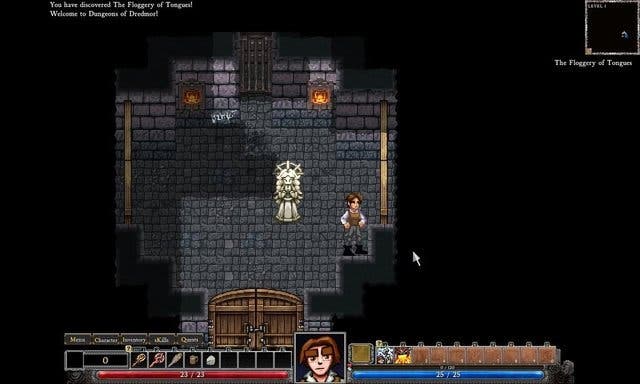Game of the Week: Dungeons of Dredmor
When is a beta not a beta?
We were supposed to be bringing you two reviews of indie roguelikes this week. Yes, things really are the quiet - Fruit Ninja Kinect, though I'm sure it has its charms, was never likely to sustain Summer of Arcade's unbroken run of Games of the Week.
But as I've noted before, the PC (and increasingly, Mac) indie scene is a reliable source of interesting games to play and write about when the release schedules let you down. And the roguelike is edging out tower defence as its current obsession. (By the way, for those that were asking, a roguelike is defined by Wikipedia as "a sub-genre of role-playing video games, characterised by randomisation for replayability, permanent death and turn-based movement".)
One of those reviews was supposed to be of Desktop Dungeons, one of an increasing number of indie games that, following eagerly in Minecraft's banknote-strewn wake, has chosen to commercialise a near-complete beta. In theory, the game isn't complete yet, but you can help it get there from both ends - by paying to play it, and testing it with your play. Fan communities are usually happy to help underdog developers out in this way if their game is unique or exciting enough.
Knowing when a game is in a fit state to review is not an exact science, which is the main reason we find ourselves in the embarrassing position of never having reviewed Minecraft. (It was, after all, still in alpha when the buzz was at its height.) In theory, however, if the developer feels able to attach a price tag to it, we ought to be able to attach a score.
But we're not in the business of punishing indie developers for not having finished their games on their own time - and on further investigation, Desktop Dungeons proved to be missing vital features, including an endgame. Our reviewer wasn't happy to rate it yet, so we'll return to it another time.
As games do an increasing amount of growing up in public - and crowd-funded indie games like Minecraft prove themselves capable of becoming global hits - reviewers and developers need to work together to pick our way out of this mess. Perhaps terms like 'alpha' and 'beta' are no longer adequate for commercial development phases.
In the meantime, we'll continue to examine each case individually. My experience with online game reviews, MMOs in particular, tells me that no two cases are the same.
And in future, when times are quiet, I'll always remember to ask Christian Donlan what the hell that is on his laptop.
Dungeons of Dredmor
A Blizzard staffer wandered up to me on my recent visit and complained that most games, for some reason, weren't really holding his attention. The exceptions all belonged to a peculiarly vicious, homespun strain of indie RPG - and Dungeons of Dredmor was his example.

Christian, stood nearby, soon jumped in and their conversation immediately became incomprehensible to me. I thought it was because I was out of my depth - I don't really 'do' roguelikes - but it turns out it's because Dungeons of Dredmor is quite silly.
"This is NetHack with an early-nineties LucasArts presentation slapped on top: gangly, squelchily-animated characters, a lead who appears to be Guybrush Threepwood by way of Stan Sitwell, silly names for the potions and armour that includes traffic cones and starched shirts alongside gleaming chest plates and greaves," Christian wrote in our Dungeons of Dredmor review. "If you're after that one special game that allows you to murder the Loch Ness Monster with a baseball, good news: you've found it.
"From the procedural gobbledegook of your character epitaphs and goon chatter to achievements that come littered with references to Indiana Jones and Kubrick, this is feelgood RPG gaming at its most authentic. It's mean-spirited, dizzyingly deep, and snarkily nostalgic all at once - and those are just the skills and attributes I look for in a roguelike."
At least I know what to look for, now - and, at £3.50, where to start.

